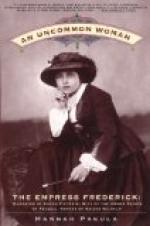In the palace of the French ambassador at Rome, Cardinal Bernis, there was an unusually busy movement to-day. From the kitchen-boys to the major-domo, all were in a most lively motion, in the most passionate activity. For this morning, while taking his chocolate, the cardinal had sent for his major-domo, and, quite contrary to the usual joviality of his manner, had very seriously and solemnly said to him: “Signor Brunelli, I to-day intrust you with a very important and responsible duty, that of making as splendid as possible the grand festival we are three days hence to give in honor of the Archduke Ferdinand. No pains must be spared, nothing must be wanting; the most luxurious richness, the most tasteful decoration, the most extravagant splendor must be exhibited. For this entertainment must excite the attention not only of Rome, but of all Europe; it must become the subject of conversation at all the courts, and, above all, it must cause the despair of all present ambassadorial housekeeping. I have very important diplomatic reasons for this. All Europe shall see how devoted France is to the empire of Austria, and what a good understanding subsists between the two courts. Therefore, Signor Brunelli, strain your inventive head, that it may on this occasion hit upon whatever is most distinguished and pre-eminent, for this must be an entertainment never before equalled. That is what I expect, what I demand of you; and if you satisfy my demands, it will give me pleasure to reward your zeal by a present of a hundred ducats.”
Thus with solemn dignity spoke the cardinal, while sipping his chocolate; and Signor Brunelli had pledged himself by a solemn oath punctually to fulfil his master’s commands, and to astonish Rome with an entertainment such as had never been recorded in the annals of diplomatic history.
With a proud step had Brunelli gone to his own private cabinet, where, having shut himself up, he had devoted several hours to serious meditation upon the deep plans presenting themselves to his mind. But Signor Brunelli had, in fact, a very experienced and inventive head, and the cardinal acted wisely in confiding in his major-domo and leaving to him the ordering of the entertainment.
He had now, with the sharp glance of a military commander, arranged his plan of battle, and felt perfectly sure of victory. He therefore rang for a servant, and commanded the attendance of the chief cook in the cabinet of the major-domo. Then with a gentlemanlike listlessness he threw himself upon the divan and began to sip his coffee with the exact dignified deportment that had been displayed by his excellency the cardinal.




